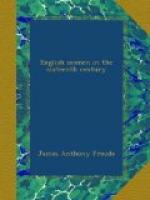had then been advanced to its present point of progress,
if there had been then recognised a Divine right to
rule in the numerical majority, even without a Spanish
army the seminary priests would have had their way.
Elizabeth’s Parliaments were controlled by the
municipalities of the towns, and the towns were Protestant.
A Parliament chosen by universal suffrage and electoral
districts would have sent Cecil and Walsingham into
private life or to the scaffold, replaced the Mass
in the churches, and reduced the Queen, if she had
been left on the throne, into the humble servant of
the Pope and Philip. It would not perhaps have
lasted, but that, so far as I can judge, would have
been the immediate result, and instead of a Reformation
we should have had the light come in the shape of
lightning. But I have often asked my Radical friends
what is to be done if out of every hundred enlightened
voters two-thirds will give their votes one way, but
are afraid to fight, and the remaining third will
not only vote but will fight too if the poll goes against
them? Which has then the right to rule?
I can tell them which will rule. The brave and
resolute minority will rule. Plato says that if
one man was stronger than all the rest of mankind
he would rule all the rest of mankind. It must
be so, because there is no appeal. The majority
must be prepared to assert their Divine right with
their right hands, or it will go the way that other
Divine rights have gone before. I will not believe
the world to have been so ill-constructed that there
are rights which cannot be enforced. It appears
to me that the true right to rule in any nation lies
with those who are best and bravest, whether their
numbers are large or small; and three centuries ago
the best and bravest part of this English nation had
determined, though they were but a third of it, that
Pope and Spaniard should be no masters of theirs.
Imagination goes for much in such excited times.
To the imagination of Europe in the sixteenth century
the power of Spain appeared irresistible if she chose
to exert it. Heretic Dutchmen might rebel in a
remote province, English pirates might take liberties
with Spanish traders, but the Prince of Parma was
making the Dutchmen feel their master at last.
The pirates were but so many wasps, with venom in
their stings, but powerless to affect the general
tendencies of things. Except to the shrewder eyes
of such men as Santa Cruz the strength of the English
at sea had been left out of count in the calculations
of the resources of Elizabeth’s Government.
Suddenly a fleet of these same pirates, sent out, unassisted
by their sovereign, by the private impulse of a few
individuals, had insulted the sacred soil of Spain
herself, sailed into Vigo, pillaged the churches,
taken anything that they required, and had gone away
unmolested. They had attacked, stormed, burnt,
or held to ransom three of Spain’s proudest
colonial cities, and had come home unfought with.
The Catholic conspirators had to recognise that they




